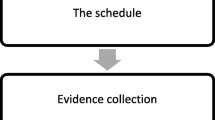Abstract
Background
Exercise courses during medical school contribute to medical students’ confidence in promoting physical activity to their patients. However, there is still a lack of uniform physical activity education across medical school curricula to equip medical students with the necessary skills and knowledge to counsel their patients about exercise.
Objective
To determine the effects of a 1.5-hour physical activity module including a one-hour exercise tutorial combined with a 30-minute practical counselling session on senior medical students’ perceptions of the importance of exercise and their perceived competence in advising older people about exercise.
Design
Pre-post survey.
Setting
University campus.
Participants
161 senior medical students taking part in the Queen Elizabeth Hospital Geriatric Medicine course in 2015 (control group) and 2016 (intervention group).
Measurement
The modified Exercise and Physical Activity Competence Questionnaire (EPACQ) was administered before and after a 4.5-week Geriatric Medicine Course. Scores ranged from 1 (not important or competent) to 6 (very important or competent). The independent T-Test and repeated-measures ANOVA was used to determine differences between intervention and control group.
Results
Medical students perceived exercise-related skills to be highly important (score ≥4) in both the intervention (4.85 ± 0.37) and control group (4.78 ± 0.67), pre-course. The overall perceived importance could not be significantly increased by the physical activity module (P=0.082). The physical activity module, however, improved medical students’ perceived competence in six out of ten exercise-related skills, and increased their overall perceived competence in counselling older people about exercise (P<0.001).
Conclusion
A 1.5-hour physical activity module improves senior medical students’ perceived competence in counselling older people about exercise. This research proves that little teaching space is needed to impact positively on medical students’ exercise counselling abilities.
Similar content being viewed by others
References
Exercise is Medicine. Healthcare Providers’ Action Guide [PDF]. Indianapolis: American College of Sports Medicine; 2017 [cited 2017/30/5]. Available from: http://www.exerciseismedicine.org/assets/page_documents/Complete%20HCP%20Action%20Guide.pdf
Taylor D. Physical activity is medicine for older adults. Postgrad Med J 2014;90(1059):26–32.
Clegg A, Young J, Iliffe S, Rikkert MO, Rockwood K. Frailty in elderly people. Lancet 2013;381(9868):752–62.
Gill TM, Gahbauer EA, Allore HG, Han L. Transitions between frailty states among community-living older persons. Arch Intern Med 2006;166(4):418–23.
Elwyn G, Williams M, Roberts C, Newcombe RG, Vincent J. Case management by nurses in primary care: analysis of 73 ‘success stories’. Qual Prim Care 2008;16(2):75–82.
Lucchetti AL, Lucchetti G, de Oliveira IN, Moreira-Almeida A, da Silva Ezequiel O. Experiencing aging or demystifying myths? - impact of different «geriatrics and gerontology» teaching strategies in first year medical students. BMC Med Educ 2017;17(1):35.
Lawton BA, Rose SB, Elley CR, Dowell AC, Fenton A, Moyes SA. Exercise on prescription for women aged 40–74 recruited through primary care: two year randomised controlled trial. BMJ 2008;337:a2509.
Weiler R, Chew S, Coombs N, Hamer M, Stamatakis E. Physical activity education in the undergraduate curricula of all UKmedical schools: are tomorrow’s doctors equipped to follow clinical guidelines? Br J Sports Med 2012;46(14):1024–6.
Cardinal BJ, Park EA, Kim M, Cardinal MK. If Exercise is Medicine, Where is Exercise in Medicine? Review of U.S. Medical Education Curricula for Physical Activity-Related Content. J Phys Act Health 2015;12(9):1336–43.
Forman-Hoffman V, Little A, Wahls T. Barriers to obesity management: a pilot study of primary care clinicians. BMC Fam Pract 2006;7:35.
Strong A, Stoutenberg M, Hobson-Powell A, Hargreaves M, Beeler H, Stamatakis E. An evaluation of physical activity training in Australian medical school curricula. J Sci Med Sport 2017;20(6):534–8.
Dacey ML, Kennedy MA, Polak R, Phillips EM. Physical activity counseling in medical school education: a systematic review. Med Educ Online 2014;19:.24325.
Jadczak AD, Tam KL, Yu S, Visvanathan R. Medical students’ perceptions of the importance of exercise and their perceived competence in prescribing exercise to older people. Australas J Ageing 2017; doi: 10.1111/ajag.12412. [Epub ahead of print].
American College of Sports Medicine. Exercise is Medicine 2017 [30 May 2017]. Available from: http://www.exerciseismedicine.org/.
Godin G, Shephard RJ. A simple method to assess exercise behavior in the community. Can J Appl Sport Sci 1985;10(3):141–6.
Godin G. The Godin-Shephard Leisure-Time Physical Activity Questionnaire. Health & Fitness Journal of Canada 2011;4(1):5.
Connaughton AV, Weiler RM, Connaughton DP Graduating medical students’ exercise prescription competence as perceived by deans and directors of medical education in the United States: implications for Healthy People 2010. Public Health Rep 2001;116(3):226–34.
Young A, Gray JA, Ennis JR.‘Exercise medicine’: the knowledge and beliefs of final-year medical students in the United Kingdom. Med Educ 1983;17(6):369–73.
Jones PR, Brooks JH, Wylie A. Realising the potential for an Olympic legacy; teaching medical students about sport and exercise medicine and exercise prescribing. Br J Sports Med 2013;47(17):1090–4.
Mohler MJ, D’Huyvetter K, Tomasa L, O’Neill L, Fain MJ. Healthy aging rounds: using healthy-aging mentors to teach medical students about physical activity and social support assessment, interviewing, and prescription. J Am Geriatr Soc 2010;58(12):2407–11.
Bass Iii PF, Stetson BA, Rising W, Wesley GC, Ritchie CS. Development and Evaluation of a Nutrition and Physical Activity Counseling Module for First-Year Medical Students. Med Educ Online 2004;9(1):4359.
Glasgow RE, Emont S, Miller DC. Assessing delivery of the five ‘As’ for patient-centered counseling. Health Promot Int 2006;21(3):245–55.
Trilk JL, Phillips EM. Incorporating ‘Exercise is Medicine’ into the University of South Carolina School of Medicine Greenville and Greenville Health System. Br J Sports Med 2014;48(3):165–7.
Vallance JK, Wylie M, MacDonald R. Medical students’ self-perceived competence and prescription of patient-centered physical activity. Prev Med 2009;48(2):164–6.
Lamarche K, Vallance J. Prescription for physical activity a survey of Canadian nurse practitioners. Can Nurse 2013;109(8):22–6.
Author information
Authors and Affiliations
Corresponding author
Rights and permissions
About this article
Cite this article
Jadczak, A.D., Tam, K.L. & Visvanathan, R. Educating Medical Students in Counselling Older Adults about Exercise: The Impact of a Physical Activity Module. J Frailty Aging 7, 113–119 (2018). https://doi.org/10.14283/jfa.2017.44
Received:
Accepted:
Published:
Issue Date:
DOI: https://doi.org/10.14283/jfa.2017.44



